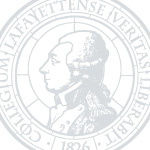
Mar 20, 2013
On Being First
Acknowledging the attention she has received as Lafayette’s first female president, Byerly is nuanced in talking about that history-making move. “As…
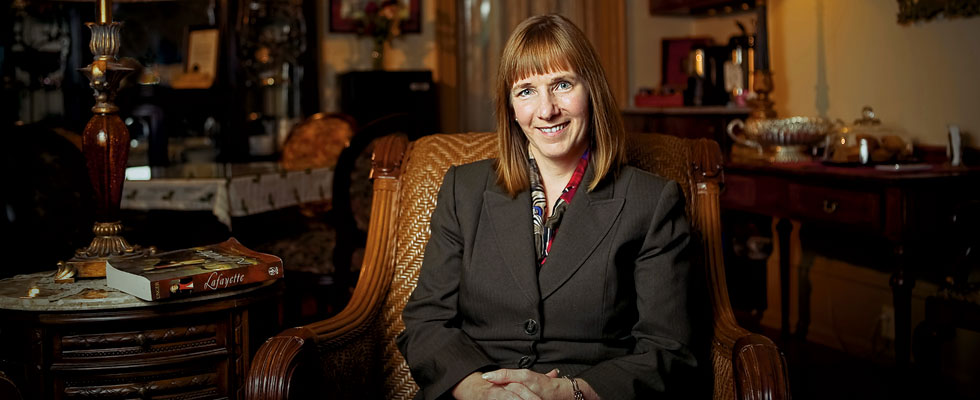
by Robert Bliwise ’76 | photography by Chuck Zovko
There’s a story that her friends tell about Alison Byerly—the high-velocity Alison Byerly, that is, who begins in July as Lafayette’s new president. The summer after she graduated from Wellesley College, she had a research internship working for two Wellesley English professors. It was a great warmup for graduate school, she says. She was living in a house in the Boston neighborhood of Jamaica Plain that was not very close to the T (subway) stop; the bus ran infrequently, and she couldn’t drag a bike on the T. So using her earnings from a student writing prize, she invested in a pair of expensive, heavy-duty roller skates. Decked out in knee pads and a bicycle helmet borrowed from a sympathetic professor, she would skate from her house to the Brookline Village T stop, ride the T, then get off and skate to campus, which was several miles, including some pretty serious hills.
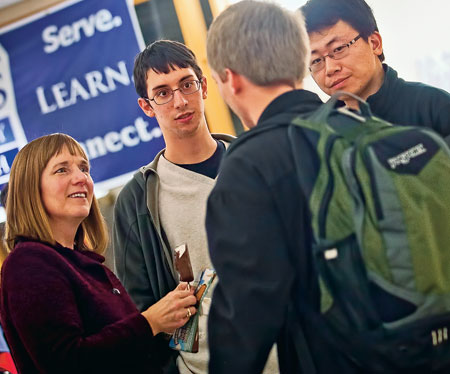
Alison Byerly met many students, including Calvin Mingione ’14 (L-R), Cory Crosbie-Foote ’14, and Xingjian (Max) Ma ’14, at an ice cream social on Jan. 30.
“Hard work going up and scary coming down,” Byerly recalls. “The skating was great training, as it turned out. By the end of the summer, I was running long enough distances that I ran my first marathon the following year.”
Byerly’s entire accelerated professional career has been spent at Middlebury College. She went to Middlebury as an assistant professor of English in 1989; her rise through the administrative ranks began less than 10 years later, when she was named associate dean of faculty. She later became dean of faculty and then, in 2007, provost, a position she left to spend a sabbatical year as a visiting scholar at MIT. Among her colleagues is Jay Parini ’70, a poet and novelist who has taught at Middlebury for 30 years. “Alison simply has a gift for leadership, a unique gift, and her brilliant mind and wide scholarly interests will be obvious in a short while to everyone in the Lafayette family,” he says.
“She has a collaborative, open, and communicative style and brings great passion and humor in addition to enormous energy and enthusiasm.” — EDWARD W. AHART ’69, CHAIR, LAFAYETTE BOARD OF TRUSTEES
Middlebury’s president, Ronald Liebowitz, says Byerly’s time as an administrator has been steeped in change and innovation—from a major reimagining of student life, to the acquisition of a graduate program 2,800 miles away in Monterey, Calif., to a commercial partnership for the teaching of online courses in languages. Few college provosts, he says, have accumulated such a broad range of experiences. “Alison was effective here because she has strong principles that guided her decision-making. And she was skilled at seeing the long-term benefits to what was not always the popular, conventional, or easy path.”
Liebowitz’s example as president taught her to value “innovative, entrepreneurial, forward thinking,” Byerly says. “Academic institutions can be much better at planning than at seizing opportunities. But particularly in today’s environment, it’s important to be willing to entertain new ideas, to be thinking about where the institution goes next, to be always looking around the next corner.”
Byerly spent some time looking around the corners of Lafayette’s campus a year ago, when she was attending the conference on the future of the liberal arts college sponsored by Lafayette and Swarthmore College. The idea of the conference pointed to Lafayette’s ambitions as an elite institution, she says. “This is a really good time for ambitious schools to make themselves more visible. A place like Lafayette can build on connections among the presidents and provosts of other colleges, use communications technology to make itself even better known to high school counselors, and become a hot school faster than ever.”
She looked to the presidential search committee as a proxy for the larger college community, she says. “And one thing I perceived very strongly was a willingness to confront challenges and to move forward on them. Lafayette is on a terrific trajectory right now with its strategic plan. My own experience at Middlebury and elsewhere is that in this fast-paced environment, circumstances can change around these plans, and they inevitably need updating. That doesn’t mean we’re not supportive of and invested in what’s currently on the table. But a strategic plan should be an organic, evolving document, not something frozen in amber, and the community should be engaged in continued discussion about where there might be shifts in emphasis.”
Growing up in Glenside, Pa., near Philadelphia, Byerly was in both the marching band and the indoor color guard at Abington High School; she owned many uniforms, she points out, in maroon and white. She says she was “a pretty serious flutist and singer” in high school, and continued that to a lesser degree in college and in graduate school. (She sings with the Middlebury College Community Choir, a group that includes students, faculty and staff members, and local singers.)
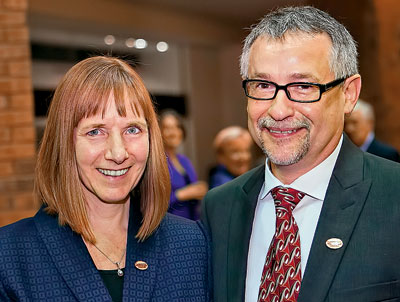
Alison Byerly and her husband, Stephen Jensen, a medical editor, are the parents of two children. Laramie is a sophomore at Carleton College, and Ryan is in ninth grade.
Even before Wellesley, Middlebury, and now Lafayette, Byerly took to a small residential college as her “natural habitat.” Her mother was an English professor at Ursinus College. “There was nothing cooler than being part of a place where everyone was trying to learn things together. What could be better than that?”
At Wellesley, where she earned honors in English, Byerly was “a star,” recalls Lisa Rodensky, who was one year behind Byerly as an undergraduate and is now an English professor at Wellesley. “She came across as a remarkable, energized, brilliant, incredibly funny, almost superhuman person. It was clear she was going to do whatever she set out to do. And she seemed to know everybody.”
Byerly enlarged her network as the editor of WRagtime, a student magazine. “It was a great leadership opportunity,” she says. “I put together a staff, planned issues, did the layout, dealt with the printer—things that accented the fact that in a small residential college, the out-of-classroom experiences can be as formative as the in-class experiences.”
That work influenced her decision to do a senior thesis on Victorian novelist George Eliot—particularly the rhetorical strategies Eliot deployed to connect with readers. Byerly worked with Robert Garis, well-known as a ballet critic as well as a literary scholar who was, for many students, an intimidating figure. “The fact that I was myself writing lots of pieces using the editorial ‘we’ may have sharpened my interest in the question of how, as a writer, you try to link your own experience and views with those of your audience,” Byerly says. “It has remained a foundational interest in all of my work. In fact, in many ways, that process is a metaphor for what I think one tries to accomplish as the leader of an academic institution.”
“Lafayette is well positioned to lead at a time when many liberal arts colleges are looking for ways to extend their reach further into the world of technology and to connect the traditional liberal arts disciplines with opportunities to pursue more project-based, hands-on modes of inquiry.” — ALISON BYERLY
Byerly went on to pursue an M.A. and Ph.D. at the University of Pennsylvania, where she studied with Elaine Scarry and Nina Auerbach and, for her dissertation, wrote on the representation of art in 19th-century literature. Penn’s English department was “a terrific scholarly community,” she says. “I was very well supported with fellowships, but also got great teaching experience.” Penn was “unusual among Ivy League universities at that time in the level of mentoring it provided on teaching as well as research.” She also met her husband, Stephen Jensen, in graduate school. After receiving an M.A. in English, he worked for a Philadelphia publishing company, J.B. Lippincott, as a medical editor, a career he continued on a freelance basis when they moved to Vermont. They now have two children: Their daughter, Laramie, is a sophomore at Carleton College; their son, Ryan, is in ninth grade.
Byerly’s first English class at Wellesley was taught by Margery Sabin. The two stay in touch, and Sabin has a long affiliation with Middlebury’s Bread Loaf School of English. Shortly after Byerly joined the academic administration, Sabin served on a committee of outside scholars visiting Middlebury to evaluate the English department—Byerly’s home department. That might have been “tricky” for Byerly, Sabin recalls, but she was “brilliant” at negotiating tensions over intellectual directions. “She had so much information in her head, she was so quick in her analysis, so open to listening, so imaginative in seeing how issues could be resolved—at that time, I knew she was going to go far as an administrator.”
What Byerly most liked in her role as provost was “seeing a broader swath of the institution,” she says. “As provost, you really have to understand budgets, academic politics, the appointments process, and how all those pieces fi t together to create an academic experience. As a faculty member, you see your own classroom and to some extent the department. But you don’t necessarily see the curriculum as a whole, as a living organism that you can help shape.”
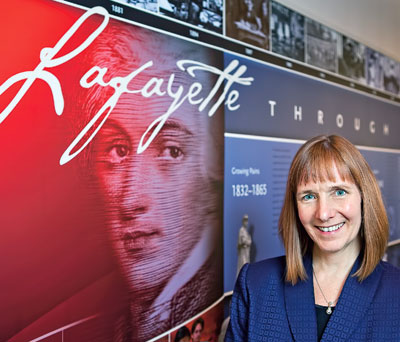 Having a footing both in teaching and administration will benefit her as Lafayette’s president, she says. “Both involve paying attention to the dynamics of a room, hearing what people are asking, and responding meaningfully. I’m interested in how people work together to create something, whether, as a teacher, it’s an understanding of the world of Dickens or, as an administrator, a new residential experience on campus.”
Having a footing both in teaching and administration will benefit her as Lafayette’s president, she says. “Both involve paying attention to the dynamics of a room, hearing what people are asking, and responding meaningfully. I’m interested in how people work together to create something, whether, as a teacher, it’s an understanding of the world of Dickens or, as an administrator, a new residential experience on campus.”
Academic committees can be “contentious, distracted, and unfocused,” observes Kathryn Morse, who has directed Middlebury’s Program in Environmental Studies. Having served on numerous committees under Byerly’s leadership, she calls her “organized, hardworking, and well-prepared, yet fl exible. She is a master of listening to a wide range of opinions and points and debates and tangential conversations and then, at the crucial point in the meeting, reflecting back to people the central points that need to be decided on and the key steps for moving forward. She has a talent for letting people vent, spew, and brainstorm, reflecting back the heart of what they’ve been saying in a way that’s clarifying, and then leading them to a fair and democratic closure.”
Byerly worked to build on Middlebury’s European programs and expand its reach into Asia and the Middle East, says Jeffrey Cason, dean of international programs there. Cason was impressed by Byerly’s cool-headedness and analytical sharpness, not just in international education, but also in the equally fraught area of faculty recruiting. “Everything in that context feels like a crisis, from investigating the possibility of spousal employment to authorizing the terms of an offer,” he says. “I was impressed by how many things Alison managed to juggle and how she was able to reach reasoned decisions.”
Ten years ago, Byerly and Cason, a political scientist, co-taught a course on politics and the novel. Byerly has kept up her teaching, which has taken new directions. Her most recent course, “Fictional Worlds,” looked at how narratives immerse readers (or viewers) in a coherent and convincing universe. Students’ evaluations were uniformly glowing: “Great class”; “Byerly facilitates better discussion than I’ve ever had at Middlebury”; “I got more information and time went much faster than in any other 75-minute class I’ve taken here.”
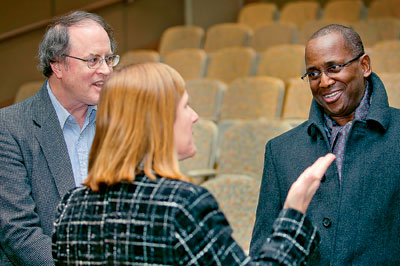
Andrew Doughterty (left), associate professor of physics, and Ian Smith, professor of English, were among the faculty and staff who spoke with Alison Byerly at a reception in Oechsle Hall on Jan. 31.
As a scholar, too, Byerly has crossed the boundaries of disciplines. Her first book, Realism, Representation, and the Arts in Nineteenth-Century Literature, published by Cambridge University Press in 1997, scrutinizes the novels of Bronte, Thackeray, and Hardy—along with George Eliot—and the their metaphor-rich references to portraits, caricatures, charades, and musical performances. A new book, Are We There Yet? Virtual Travel and Victorian Realism, just published by the University of Michigan Press, links new ways of representing place in the Victorian era—360-degree panoramas, foldout river maps, comprehensive railway guides—and 21stcentury forms of “virtual travel.”
Byerly says online resources have allowed her to direct her students to multiple sources of information about, say, Victorian literature, and to use her classroom time more imaginatively. And she observes that while teaching technologies aren’t likely to supplant the seminar, they are powerful in some circumstances, such as language instruction, which benefits from repetitive drilling and self-paced learning. In recent years, she has lectured widely, in settings ranging from the Modern Language Association to MIT’s Communications Forum, on digital humanities and social media.
In her view, nontraditional forms of instruction, including massively open online courses, or MOOCs, have validated the importance of good teaching—something a small residential college should take to heart. Last fall, in Inside Higher Ed, she acknowledged the potential of innovative technologies in higher education. But she cautioned against neglecting the enduring role of the teacher: “You have a vested interest in your students’ progress, and your own success as a teacher is related to their success at mastering the course material you have designed. . . . Above all, you notice if they are learning, and adjust your presentation of material if they are not.”
At home in the virtual world, Byerly is active on Twitter, a fast-paced technology for a fast-paced thinker. This winter, @alisonbyerly tweeted new messages appropriate to her status: “Headed to PA, looking forward to @LafayetteHoops”; “Gotta love competition w/events like Rhetorical Criticism, Persuasion, & After Dinner Speaking. Congrats to @Laf_Forensics—third in PA!”; “Great to meet many @LafCol students @ ice cream social. Thx to Dining Svces for making it Ben & Jerry’s in honor of VT—felt right at home!”
Bliwise ’76 is editor of Duke Magazine and teaches magazine journalism at Duke University.

Acknowledging the attention she has received as Lafayette’s first female president, Byerly is nuanced in talking about that history-making move. “As…
Alison R. Byerly was named Lafayette’s 17th president on Jan. 16 and will take office July 1, succeeding Daniel H. Weiss. A nationally recognized scholar…